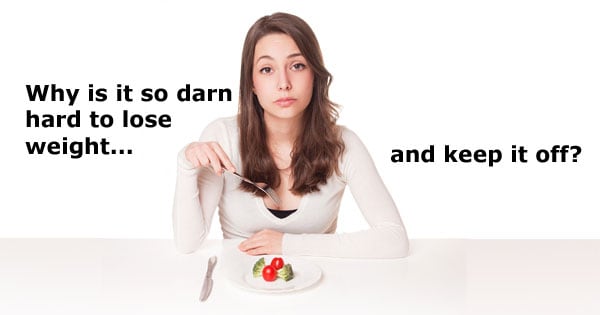Why is it So Darn Hard to Lose Weight? And Keep It Off!
by Erika Slater
So, why is it so darn hard to lose weight and keep it off? It can’t be just about diet can it? No, there’s something more fundamental going on here…
By the fact you’re reading this article I know you want to do something about losing weight. Most likely you’ve tried before (dare I say many?) and are at the same point again wondering how to make it stick this time?
People go to extremes and try various expensive weight loss programs, exercise programs, and even diet pills and ‘miracle’ supplements to try and lose weight.
Many also try various diet fads, low carb diets one moment, and then low fat diets the next, only to find themselves taking backward steps while muttering, “Why is it so darn hard to lose weight?”
So, why is it so darn hard to lose weight?
Unfortunately, we sabotage ourselves most of the time, especially when the “honeymoon” period of our diet is over, and we plateau and think, “I have to eat this for ever?” But take heart in the fact you’re also the solution and eating healthy doesn’t meaning nibbling salad for the rest of your life.
There are four primary reasons why it can be hard for YOU to lose weight.
1. Your mindset is flawed – this is the problem for most.
2. Confusing information from “experts” and those trying to squeeze the “last dollar out of your wallet.”
3. Your metabolism or body chemistry is working against you – this is rare and even then you can overcome it with professional guidance.
4. Your fat cells are not opening – no matter what you do you can’t get rid of those love handles or cellulite marks.
By the end of this article you’ll understand exactly what you need to do to be successful when you decide to lose weight but this time… keep it off.
And if you go in with the right mindset… it’ll be easier than ever before.
Now easier doesn’t mean I’m going to produce a “magic wand” or sprinkle “fairy dust” over you, and you’ll shed pounds while you sleep overnight. I realize you’re smarter than that, and besides I’m not selling any snake oil.
Easier in this context means weight loss as an industry has just got way too complicated, and I’m aiming to simplify the decisions you need to make and what it’ll entail for you to lose weight and keep it off.
If this sounds like a reasonable approach then let’s get started together right at the beginning…
WHY IT’S HARD TO LOSE WEIGHT:

There are usually two primary reasons:
1. Health
2. Look and Feel Good
Now, these are not mutually exclusive, but one is usually the main driver. Some people tag this driver as their “big why.”
Health-wise you may be concerned you’re overweight and the toll this can have on your organs and immune systems.
Maybe your Doctor, friends or family are concerned and its been recommended you lose weight. Alternatively, you may have just decided you want a healthier diet and are ready for a permanent lifestyle change.
You want to look and feel good. Despite what you may feel after reading this reason and feel it’s vain… it’s not. You have my permission to feel good about this reason because it’s a strong driver to success if you can focus on it. It’s also got to do with positive self-esteem and confidence. When it comes to self-esteem and confidence, feeling good about how you look is super important.
You may have another reason I’ve not listed, but as long as it’s a powerful driver for you wanting to lose weight, and keeping it off, that’s fine and you can keep it to yourself.
Why am I focused on having a powerful driver or a “big why” when it comes to weight loss?
Well, because after the easy “honeymoon” period of losing pounds of water in the first few weeks you’ll reach a plateau, and you’ll begin to be challenged with all sorts of temptations to steer you off your chosen path to weight loss.
So, let’s look at some primary reasons people fail to get to their right size and stay there…
WHY WE FAIL TO LOSE WEIGHT AND KEEP IT OFF:
I could list a book of reasons but I’ll cover the main ones I often come across with my clients.
- We “Buy” into various Weight Loss Myths.
- Unrealistic Goals.
- Emotional Eating.
- Confusing Nutrition Information.
1. Weight Loss Myths:

A frequent touted myth is calories in and calories out argument. This suggests to lose weight all you do is burn more calories than you take in.
While this makes sense at the mathematical level the fact is our body is much more complicated than a simple formula. The formula works for few people in my experience but fails for those who’ve struggled for years to lose weight and they end up starving themselves of needed nutrition to fulfill the formula obligation. Additionally nobody really knows the burn rate of calories for an individual, only an average, and you’re not an average of anything!
Another common myth is to only focus on your diet. The fact is any reasonable and healthy diet can help you lose weight, but there’s so much conflicting information out there today it’s difficult knowing the right one to chose.
Keep it simple. Cut out processed foods, especially added sugar, limit diary, and eat plenty of vegetables and fruits. Ensure each dinner includes protein but vary where you get it from and not just meat.
The weight scale is the bible and best measure of weight loss. Not true. As you get older you lose muscle mass easier and you’ll want to get your muscle strength back. This may increase your weight but it’ll disappear fat from your stomach. How do your clothes fit and how do you feel – let that decide on your diet and fitness plans rather than just your scale.
Lastly, I’ll tackle the myth of Willpower.
I’ve heard willpower described as a finite resource you have each day. You have a full tank at the beginning and as the day progresses you tap into it and it depletes, and by the time you reach the end of the day it’s all gone. This means when you have tasks to do at end of the day which requires willpower then you’ve little available, and likely it’ll not get done, or you’ll make the “easy” decision and slip into poor habits.
Likely, you can see where this is going as regards food and eating habits.
The theory is when you get home after a long and stressful day and no willpower left then when faced with the choice of what to cook and eat you’ll take the easy way out, and eat junk and/or unhealthy quick dinners.
There’s even some sense to it up to a point. But it fails to take into account your reasons and your “Big Why.” I don’t buy into willpower being a finite resource and being depleted over the day.
Willpower is tapped into for certain activities and not all. We need it to overcome temptations or making good/bad choices.
For more on the myths that surround Willpower see the link in the resource section below.
My experience is Willpower is linked to your “Big Why” we spoke about earlier.
Have a compelling reason to lose weight and stay eating healthy and willpower will be there for you when you need it… even at the last minute of your day.
2. Unrealistic Goals:
I’m going to generalize here but not attempt to smear any one company or person. Ignore the weight loss advertising and marketing that have testimonials from folks losing 30 lbs in their first three weeks. Most of these folks had many lbs to lose anyway and its mostly water they’ve lost as well and not real fat or solid weight.
In my experience with folks, steady small loss is healthier and more realistic. It’s just not as sexy and doesn’t sell expensive dinners or services. If you lose a few pounds every few weeks – say 1.5-2 lbs – and its consistent then that’s so much better for your body than rapid loss you can’t sustain.
Think about it – 2 lbs every two weeks means in one year you’ll lose 52 lbs. Most people will be ecstatic to lose that much. The fact is at that pace you’ll be able to sustain it beyond a year as you’ve changed to a healthy lifestyle and it’ll be… a habit.
3. Emotional Eating:

There are some body chemistry reasons why people put on weight but by and large its generally too much of the wrong foods. If you accept this and that we tend to eat way beyond what we need to satisfy hunger then what remains for eating habits is around our emotions.
We may overeat because we’re depressed, sad or stressed, crave sugar or just had a bad day. We eat, and its usually poor food choices, under these conditions for comfort. It makes us feel better. Because feeling is an emotion then we call it emotional eating.
BTW: we all do it from time to time so no throwing stones from me or anybody else.
Dr. Gould has a blog full of articles about emotional eating and covers traps and tips and how to overcome sabotaging yourself. I’ve included a link to Dr. Gould in the resource section.
The point here why you fail in this area is because emotional eating makes staying on your diet difficult because… emotions are powerful, and can trump even your best of intentions.
4. Confusing Nutrition Information:
It seems these days everybody is inventing a diet. Many put together by M.D. Doctors who have specialized and studied people in their sphere of the world and determined the ideal diet for human beings. Remember the “one size fits all” myth?
Other professionals want to give you a pill for high cholesterol rather than tackling your diet and nutrition – at least they understand how difficult it is to change habits and behavior so, instead take the easy way out.
Nutritionists mostly keep to rote learning they got when they received their qualifications, and at worst this means using out-of-date information about portions and types of foods you should have, or not have, in your diet. Even the often cited government food pyramid, which was recently updated, continues to cater for the food industry and doesn’t reflect what we know about a healthy diet these days.
If I sound a little jaded to you on nutrition information from “experts” then I am. And I suspect so are you. It’s just got way over complicated. It should be easy.
If you’ve ever watched squirrels feeding then they tend to all stick to same foods – basically, nuts and fruits. I haven’t seen a bunch of squirrels all on a Paleo diet, and another bunch in a different part of the park feasting on the South Beach Diet. No, nuts and fruits are good for them.
Yes, I’m being a little cheeky and thumbing at so-called diet gurus. Because at the end of the day it’s just confusing as hell, and frankly not necessary.
Spoiler Alert: Eat plenty of vegetables, fruits and salads, avoid processed foods and sugars, and get your daily protein needs from meats or other foods. Sorry, most carbs are not good for you, including breads and pasta. If you do this then you can avoid all the diet nonsense out there until you feel time is right to spice things up a bit.
PLAN FOR WEIGHT LOSS AND EATING HEALTHY PERMANENTLY:
So, up to now I’ve talked about all the things that likely have stopped you losing weight and keeping it off. The fact is losing weight is easier than keeping it off. Sure, folks give up before they’ve reached their weight loss goals but more don’t have a plan for keeping it off once they get to their ideal weight.
But once you’ve read this section then you’ll know what you need to do and what to expect.
1. Setting Expectations:
When I say setting expectations I’m talking about realistic expectations. You’ll shed a lot of pounds in the first few weeks on any diet. But its mostly water. You also don’t want to lose a lot quickly as this isn’t healthy and certainly not sustainable.
Aim for a steady loss of a few pounds every two weeks. By a few I mean 2 lbs. This becomes easier for you if you also exercise by walking daily. I walk an average of 2 miles a day twice daily, and speed isn’t important.
Again, set realistic expectations on exercise. If exercise is a challenge for you because of health then you’ll need to focus more on healthy foods only.
I see too many people who want to lose weight set unrealistic expectations about how much they can lose in a specific time period. They forget they can’t eradicate decades of poor food choices and being overweight within a few months. Being unrealistic means when they do hit the inevitable plateau then they get demoralized, and then lose interest and slide back to an unhealthy diet quickly.
If you were running a marathon then you’d need to pace yourself to ensure you finish. Changing to a healthy diet is a long-term play. and so plan for this at the outset and pace yourself.
2. Goal Setting and Planning:

I’m not a goal setting junky but you’ll find the more specific goals you set for your weight, and detailed plans you make, the likelihood of achieving them is dramatically increased.
You see, when you set goals you have to set ‘exact goals’ you believe in, and not random or arbitrary desires. To say you want to lose weight is one thing, however, to come up with an exact weight loss ‘number’ or goal is another ball of wax.
When you merely say you want to lose weight, your mind is not fixed on an exact number (of pounds) and it doesn’t really have a perfect end point to identify as being set as a successful goal.
For example, if you said, “I want to lose weight!” and then started some diet or weight loss program, then stepped on a scale one week later and saw that you lost two pounds, both your conscious and unconscious minds deemed your endeavors a success and can then stop pushing you to lose weight.
Why is that?
As far as your unconscious mind is concerned, you achieved your goal – you lost weight. After all, you just stated you wanted to lose weight, you didn’t state in quantifiable terms how much ‘actual’ weight you wanted to lose.
You have to remember specific intentions not only rule the world, but also rule your life, including your ‘weight loss.’ Always be specific in terms of an actual ideal body weight you wish to reach and set that as your intention.
Next set a time…
The problem so many people have with losing weight is they don’t set adequate or specific time parameters for both starting their weight loss program, and setting a time frame for which to accomplish it by. You need to be very specific with both of these.
First off, if you merely state you’d like to lose weight, start a weight loss program, diet or exercise program, you must set an intention for when you want to start it, and the exact amount of weight you want to have lost at the end of that time period.
The unconscious mind is your GPS.
Your conscious mind feeds it the details, and the unconscious mind plots the course and monitors progress. It literally becomes like a child fixated on getting a piece of chocolate it sees sitting on a table, and doing whatever it takes to get that chocolate.
The unconscious mind will work to reach the weight loss goal you set by conditioning it repeatedly, telling it how much weight you want to lose by a specific time.
Write your goals down and share them with somebody.
Its been proven in numerous studies – one in particular by Harvard –the mere act of writing down goals increases likelihood of them happening by 99%. Regardless what the “real” percentage is there’s enough evidence writing your goals down is a positive action to take.
It also keeps you honest to share your goals with at least one person. Sharing with a support friend of family member tends to push us as we don’t want to feel a failure or let somebody else down.
In addition to setting short-term goals I’m going to recommend you take this a little further and plan your meals for a week.
Having goals is great but planning to make your goals is better. I’m not going to write your goals for you but I would have some long-term and short-term goals. Long-term should be where you want to be in one year. If you need to lose 50 pounds then put that as your 12-month goal. Remember 2 lbs every two weeks equates to 56 lbs in one year.
Short-term could be one-month goal of losing 4 lbs or not having that dress feel so tight. Be open to having goals not tied to a scale or pounds. More about this in another section.
I’ve mixed feelings about weight scales but if you tie success to a scale then invest in a quality and accurate one. Remember our weight fluctuates throughout the day so be consistent about the time of day you weigh yourself so you’re comparing apples to apples.
Once you have your goals then plan out how you’ll achieve them. I like to plan meals one week in advance when grocery shopping. This means you don’t have to think too hard what you’ll eat that day as you have the ingredients on-hand already, and no excuses to skip your diet that day because its been a tough day, and you just can’t be bothered. Soups and salads can be prepared ahead of time as well.
As regards planning to achieve long-term goals than chunk it down to small steps. For example, if your goal is to lose 50 lbs over 12-month period then work backwards on what that means monthly to lose. This then becomes your target for one-month for you to plan.
I would recommend you have more than just one long-term goal. It could be you also want to go on a vacation somewhere where you can do new activities you want to try. It could also be related to fitting into a dress or suit you haven’t been able to wear in many years.
A lot of my clients add in daily exercise to their new lifestyle and so they plan on walking or running a charitable event in the future and this becomes their “big why” and long-term goal. But the point is they plan to get fit over a year by having and meeting their daily goal, and by planning to walk/run a few miles each day.
You may have heard of the term SMART Goals. The letters can stand for many things but generally they stand for Specific, Measurable, Attainable or Achievable, Realistic and Time-based. It’s become common-place in corporate and business environment. It’s also popular with many life coaches. I’ve provided a link in the resource section below to some more information on this site to get you started. Just don’t get too carried away with it.
3. Life Style Changes:

What do I mean by lifestyle changes?
Its about changing the choices you make moving forward to move you towards a positive and healthy lifestyle. It’s about creating new habits supporting your goals and where you want to be.
It includes a healthy diet and portions. It includes regular exercise to support your body, and a healthy mindset to support your thoughts and feelings about yourself, others and your finances.
Some folks need all three and I call this a lifestyle makeover. Others focus on their weight and exercise. However, I’ve found that the three areas I’ve mentioned tend to be inter-related.
As this article is focused on why it’s so difficult to lose weight, and keep it off, then obviously what got you to this point with your weight is a bunch of food choices you’ll need to abandon moving forward, as they’ll not support your future goals. However, its important for you to realize that food choices also involve emotional choices which are affected by your mindset.
Those with this approach have set a long-term sustainable path that encompasses much more than constant attention to food, but instead to make healthy choices about many things automatically with no feeling of regret or feeling deprived.
4. Don’t Measure the Pounds:
I understand the urge to fixate on getting on the scales every day to measure progress. It’s natural to be happy or disappointed when using pounds as a barometer.
It’s a dangerous game though. Here’s why…
Being at your right size and weight is more than ponds. It’s about how you feel emotionally and how your clothes feel.
Example. As you mature you lose muscle mass and tend to put on pounds around the waist. The fact is losing muscle mass is not good. It means you lose flexibility and strength. These two things are needed for keeping you healthy.
Those people who realize this include weights in their exercise regime. Lifting weights helps increase muscle mass which is good for you at any age. If you also eat healthy then you’ll not necessarily lose much weight in pounds on the scale. However, you’ll shift pounds from your middle to your muscles so to speak.
The point here isn’t to get focused on losing pounds only as your barometer of progress, as the better measurement is are you fitting into your clothes more relaxed?
Reread the section where I talk about your habit of scale reading and avoid doing this daily if you can.
5. How Do You Feel?

However, you can still feel out of sorts even when eating healthy.
If this is you then seek professional advice. You may have a medical condition that’ll interfere with your motivation to stay the course on your lifestyle changes.
Most people though will begin to feel much better on a healthy diet after a few weeks when they’ve completed their “toxic cleanse.”
Once you give your body a chance to flush out the bad stuff then you’ll be amazed at how you feel both physically and mentally.
It just takes some time, so, stay the course.
Feeling good is also achieved by being able to wear clothes you haven’t fitted into in years, or by wearing fashions not limited to oversize stock.
As I’ve repeated a few times already, don’t fall into the “how do I feel” trap of only feeling good by what your weight scale says.
6. Fat Cells and Red-Light Therapy:
Sometimes you just need a boost to get you going on weight loss!
Many people have what’s called stubborn fat, that is it seems to congregate in one or two places and be difficult to eliminate. Typically this can be around the belly and thighs, or even the chin. While folks can lose weight on diets they still seem to end up with fat in these places. Red-light therapy is a way to open the fat cells in these “stubborn” areas to release the fat into your system so it can be expelled by the system using exercise.
Also known as Laser-Like Lipo this is done using safe technology. It has proven to help people at the start of their weight loss journey get rid of fat and reduce inches in just a few weeks so they can see results quickly and get the motivation to make the long-term healthy changes needed to stay their ideal weight.
CONCLUSION:
Losing weight and keeping it off IS hard… especially if you don’t have a plan to get and stay there.
It means making some difficult food choices and lifestyle changes if you want the weight loss to be permanent.
There will be peaks and plateaus and an occasion slip. Having written goals you share, and an important reason why you want to lose weight, will help you through the peaks and valleys of sticking to your lifestyle changes.
Choose a simple diet based on foods you can shop and prepare easily, preferably ahead of time to avoid skipping your diet on any given day. Avoid processed foods and added sugar.
Be content with small and steady weight loss over time.
Combine diet with exercise even if its just walking a few miles once a day or every two. Be consistent and persistent.
Don’t be a slave to your scale as this only shows part of the picture. How you feel is equally important.
One of the most efficient and fastest means for getting your unconscious mind to accept your goal and set your GPS is through hypnosis. Hypnosis can help bypass the surface clutter of your conscious mind to overcome the history of failed attempts at getting to and staying at your goal weight – that feel good weight.
My diet agnostic weight loss program is available in-office or online. If you want to learn more about my weight loss hypnosis service then check it out here >>> or contact me here if you have a specific question.
ADDITIONAL RESOURCES FOR WEIGHT MANAGEMENT:
Emotional Eating – Shrink Yourself Blog – Dr. Gould >>>
Why is it So Darn Hard to Overcome Sugar Addiction? >>>
Introduction to Emotional Eating Disorder >>>
The Most Important Secrets to Permanent Weight Loss >>>
Private Weight Loss Hypnosis Service >>>
The Difference Between Interest Versus Commitment to Make Changes >>>
Self-Control – Setting Limits and Living Life in Moderation >>>
5 Myths About Willpower – Kris Vallotton >>>
Laser-Like Lipo Red-Light Therapy for Fat Loss >>>
Erika Slater CH
Free At Last Hypnosis
Massachusetts
CATEGORIES
FEATURED POSTS
Interested in making a significant change in your life and interested in learning more about what I do and how I do it? Discover my hypnotherapy services here or contact me here.

DISCOVER HOW TO START CHANGING HABITS TODAY.
In this free audio hypnosis session, you’ll experience the power of your subconscious mind to begin to change your habits. If you've never experienced hypnosis before then this is a great introduction...


